UK Business Law: An Analysis of Legal Systems, Sources, and Employment
VerifiedAdded on 2023/06/06
|9
|2789
|390
Report
AI Summary
This report provides a comprehensive overview of business law in the UK, beginning with a classification of law and an identification of the legal systems in England and Wales, Scotland, and Northern Ireland. It explains civil and criminal law within the English legal system and the roles of the High Court and Supreme Court. The report then explores case law and legislation as sources of law, detailing the legislative process in the UK and delegated legislation. Finally, it examines UK employment law, focusing on the statutory duties of employers, including providing a minimum wage, minimum level of holidays, and ensuring health and safety. It also addresses wrongful and unfair dismissal actions, highlighting employee rights and potential legal recourse through employment tribunals. This document is available on Desklib, a platform offering AI-based study tools for students.

Business law (template)
Paraphrase This Document
Need a fresh take? Get an instant paraphrase of this document with our AI Paraphraser
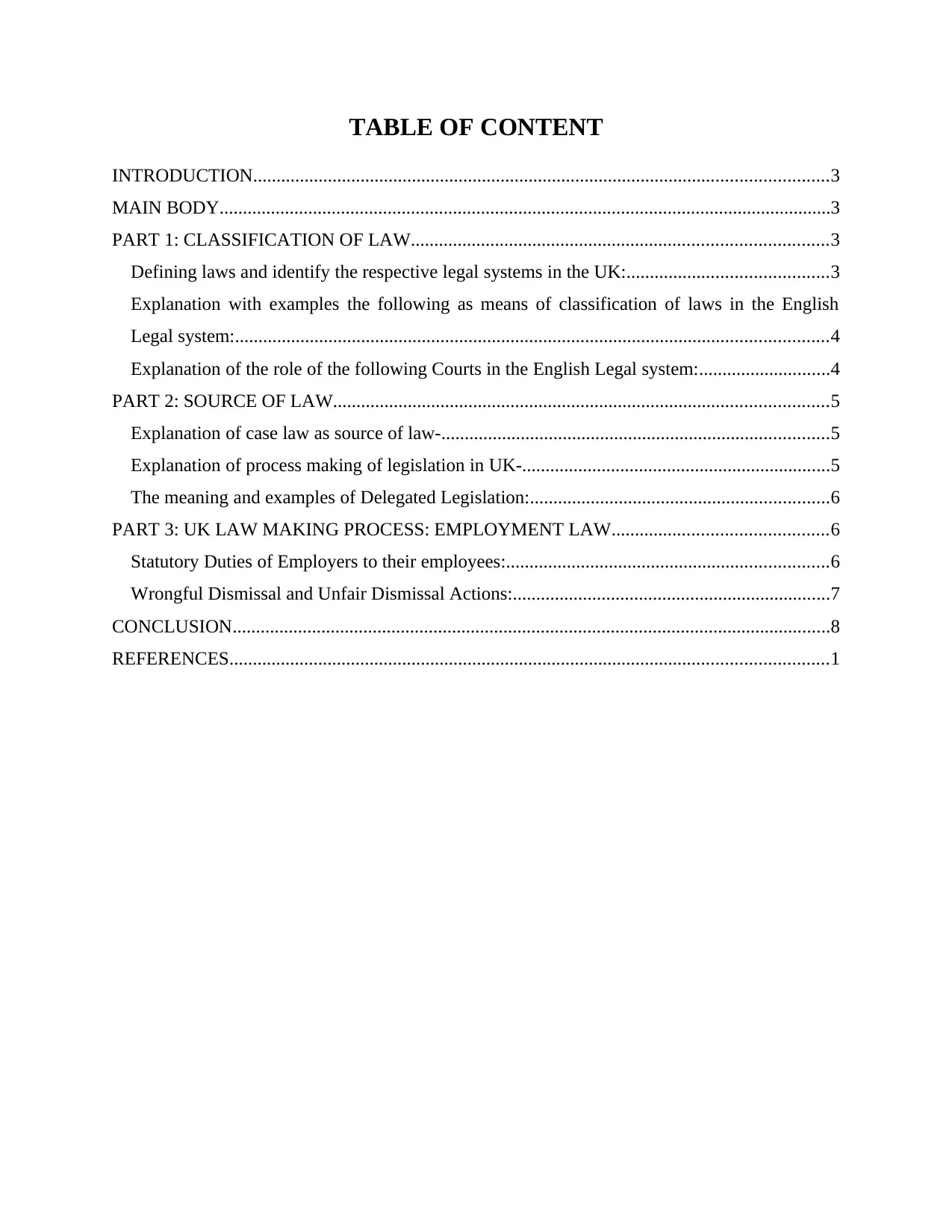
TABLE OF CONTENT
INTRODUCTION...........................................................................................................................3
MAIN BODY...................................................................................................................................3
PART 1: CLASSIFICATION OF LAW.........................................................................................3
Defining laws and identify the respective legal systems in the UK:...........................................3
Explanation with examples the following as means of classification of laws in the English
Legal system:...............................................................................................................................4
Explanation of the role of the following Courts in the English Legal system:............................4
PART 2: SOURCE OF LAW..........................................................................................................5
Explanation of case law as source of law-...................................................................................5
Explanation of process making of legislation in UK-..................................................................5
The meaning and examples of Delegated Legislation:................................................................6
PART 3: UK LAW MAKING PROCESS: EMPLOYMENT LAW..............................................6
Statutory Duties of Employers to their employees:.....................................................................6
Wrongful Dismissal and Unfair Dismissal Actions:....................................................................7
CONCLUSION................................................................................................................................8
REFERENCES................................................................................................................................1
INTRODUCTION...........................................................................................................................3
MAIN BODY...................................................................................................................................3
PART 1: CLASSIFICATION OF LAW.........................................................................................3
Defining laws and identify the respective legal systems in the UK:...........................................3
Explanation with examples the following as means of classification of laws in the English
Legal system:...............................................................................................................................4
Explanation of the role of the following Courts in the English Legal system:............................4
PART 2: SOURCE OF LAW..........................................................................................................5
Explanation of case law as source of law-...................................................................................5
Explanation of process making of legislation in UK-..................................................................5
The meaning and examples of Delegated Legislation:................................................................6
PART 3: UK LAW MAKING PROCESS: EMPLOYMENT LAW..............................................6
Statutory Duties of Employers to their employees:.....................................................................6
Wrongful Dismissal and Unfair Dismissal Actions:....................................................................7
CONCLUSION................................................................................................................................8
REFERENCES................................................................................................................................1
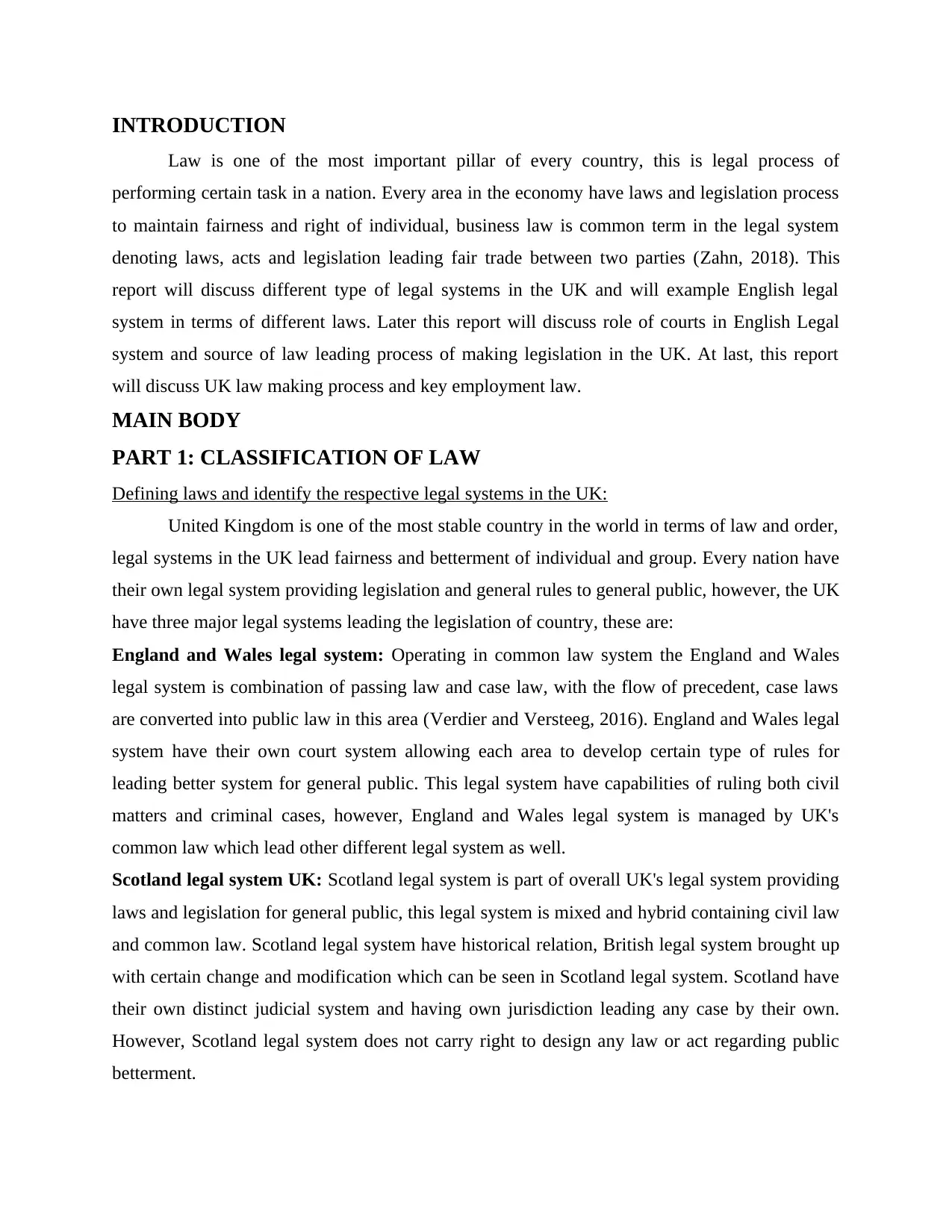
INTRODUCTION
Law is one of the most important pillar of every country, this is legal process of
performing certain task in a nation. Every area in the economy have laws and legislation process
to maintain fairness and right of individual, business law is common term in the legal system
denoting laws, acts and legislation leading fair trade between two parties (Zahn, 2018). This
report will discuss different type of legal systems in the UK and will example English legal
system in terms of different laws. Later this report will discuss role of courts in English Legal
system and source of law leading process of making legislation in the UK. At last, this report
will discuss UK law making process and key employment law.
MAIN BODY
PART 1: CLASSIFICATION OF LAW
Defining laws and identify the respective legal systems in the UK:
United Kingdom is one of the most stable country in the world in terms of law and order,
legal systems in the UK lead fairness and betterment of individual and group. Every nation have
their own legal system providing legislation and general rules to general public, however, the UK
have three major legal systems leading the legislation of country, these are:
England and Wales legal system: Operating in common law system the England and Wales
legal system is combination of passing law and case law, with the flow of precedent, case laws
are converted into public law in this area (Verdier and Versteeg, 2016). England and Wales legal
system have their own court system allowing each area to develop certain type of rules for
leading better system for general public. This legal system have capabilities of ruling both civil
matters and criminal cases, however, England and Wales legal system is managed by UK's
common law which lead other different legal system as well.
Scotland legal system UK: Scotland legal system is part of overall UK's legal system providing
laws and legislation for general public, this legal system is mixed and hybrid containing civil law
and common law. Scotland legal system have historical relation, British legal system brought up
with certain change and modification which can be seen in Scotland legal system. Scotland have
their own distinct judicial system and having own jurisdiction leading any case by their own.
However, Scotland legal system does not carry right to design any law or act regarding public
betterment.
Law is one of the most important pillar of every country, this is legal process of
performing certain task in a nation. Every area in the economy have laws and legislation process
to maintain fairness and right of individual, business law is common term in the legal system
denoting laws, acts and legislation leading fair trade between two parties (Zahn, 2018). This
report will discuss different type of legal systems in the UK and will example English legal
system in terms of different laws. Later this report will discuss role of courts in English Legal
system and source of law leading process of making legislation in the UK. At last, this report
will discuss UK law making process and key employment law.
MAIN BODY
PART 1: CLASSIFICATION OF LAW
Defining laws and identify the respective legal systems in the UK:
United Kingdom is one of the most stable country in the world in terms of law and order,
legal systems in the UK lead fairness and betterment of individual and group. Every nation have
their own legal system providing legislation and general rules to general public, however, the UK
have three major legal systems leading the legislation of country, these are:
England and Wales legal system: Operating in common law system the England and Wales
legal system is combination of passing law and case law, with the flow of precedent, case laws
are converted into public law in this area (Verdier and Versteeg, 2016). England and Wales legal
system have their own court system allowing each area to develop certain type of rules for
leading better system for general public. This legal system have capabilities of ruling both civil
matters and criminal cases, however, England and Wales legal system is managed by UK's
common law which lead other different legal system as well.
Scotland legal system UK: Scotland legal system is part of overall UK's legal system providing
laws and legislation for general public, this legal system is mixed and hybrid containing civil law
and common law. Scotland legal system have historical relation, British legal system brought up
with certain change and modification which can be seen in Scotland legal system. Scotland have
their own distinct judicial system and having own jurisdiction leading any case by their own.
However, Scotland legal system does not carry right to design any law or act regarding public
betterment.
⊘ This is a preview!⊘
Do you want full access?
Subscribe today to unlock all pages.

Trusted by 1+ million students worldwide
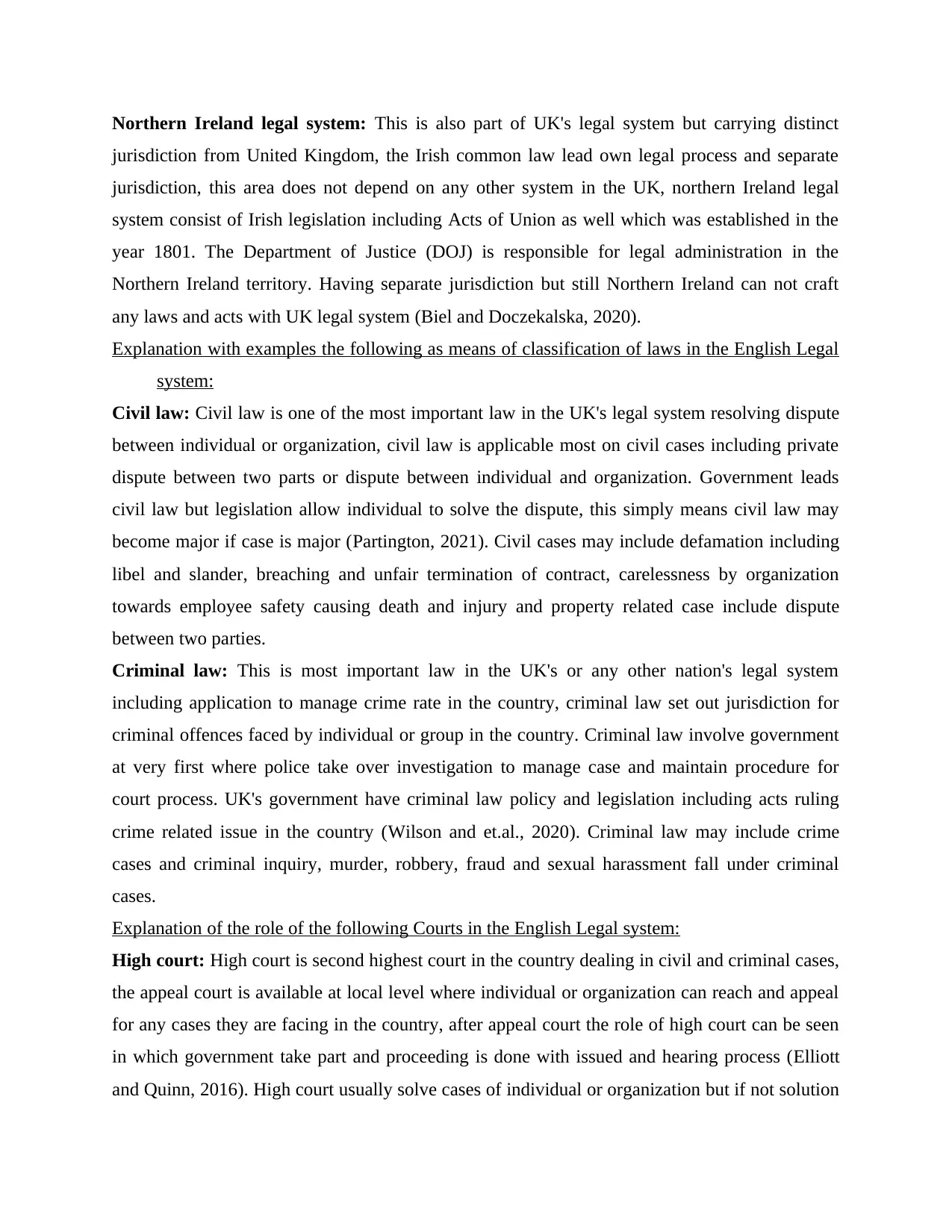
Northern Ireland legal system: This is also part of UK's legal system but carrying distinct
jurisdiction from United Kingdom, the Irish common law lead own legal process and separate
jurisdiction, this area does not depend on any other system in the UK, northern Ireland legal
system consist of Irish legislation including Acts of Union as well which was established in the
year 1801. The Department of Justice (DOJ) is responsible for legal administration in the
Northern Ireland territory. Having separate jurisdiction but still Northern Ireland can not craft
any laws and acts with UK legal system (Biel and Doczekalska, 2020).
Explanation with examples the following as means of classification of laws in the English Legal
system:
Civil law: Civil law is one of the most important law in the UK's legal system resolving dispute
between individual or organization, civil law is applicable most on civil cases including private
dispute between two parts or dispute between individual and organization. Government leads
civil law but legislation allow individual to solve the dispute, this simply means civil law may
become major if case is major (Partington, 2021). Civil cases may include defamation including
libel and slander, breaching and unfair termination of contract, carelessness by organization
towards employee safety causing death and injury and property related case include dispute
between two parties.
Criminal law: This is most important law in the UK's or any other nation's legal system
including application to manage crime rate in the country, criminal law set out jurisdiction for
criminal offences faced by individual or group in the country. Criminal law involve government
at very first where police take over investigation to manage case and maintain procedure for
court process. UK's government have criminal law policy and legislation including acts ruling
crime related issue in the country (Wilson and et.al., 2020). Criminal law may include crime
cases and criminal inquiry, murder, robbery, fraud and sexual harassment fall under criminal
cases.
Explanation of the role of the following Courts in the English Legal system:
High court: High court is second highest court in the country dealing in civil and criminal cases,
the appeal court is available at local level where individual or organization can reach and appeal
for any cases they are facing in the country, after appeal court the role of high court can be seen
in which government take part and proceeding is done with issued and hearing process (Elliott
and Quinn, 2016). High court usually solve cases of individual or organization but if not solution
jurisdiction from United Kingdom, the Irish common law lead own legal process and separate
jurisdiction, this area does not depend on any other system in the UK, northern Ireland legal
system consist of Irish legislation including Acts of Union as well which was established in the
year 1801. The Department of Justice (DOJ) is responsible for legal administration in the
Northern Ireland territory. Having separate jurisdiction but still Northern Ireland can not craft
any laws and acts with UK legal system (Biel and Doczekalska, 2020).
Explanation with examples the following as means of classification of laws in the English Legal
system:
Civil law: Civil law is one of the most important law in the UK's legal system resolving dispute
between individual or organization, civil law is applicable most on civil cases including private
dispute between two parts or dispute between individual and organization. Government leads
civil law but legislation allow individual to solve the dispute, this simply means civil law may
become major if case is major (Partington, 2021). Civil cases may include defamation including
libel and slander, breaching and unfair termination of contract, carelessness by organization
towards employee safety causing death and injury and property related case include dispute
between two parties.
Criminal law: This is most important law in the UK's or any other nation's legal system
including application to manage crime rate in the country, criminal law set out jurisdiction for
criminal offences faced by individual or group in the country. Criminal law involve government
at very first where police take over investigation to manage case and maintain procedure for
court process. UK's government have criminal law policy and legislation including acts ruling
crime related issue in the country (Wilson and et.al., 2020). Criminal law may include crime
cases and criminal inquiry, murder, robbery, fraud and sexual harassment fall under criminal
cases.
Explanation of the role of the following Courts in the English Legal system:
High court: High court is second highest court in the country dealing in civil and criminal cases,
the appeal court is available at local level where individual or organization can reach and appeal
for any cases they are facing in the country, after appeal court the role of high court can be seen
in which government take part and proceeding is done with issued and hearing process (Elliott
and Quinn, 2016). High court usually solve cases of individual or organization but if not solution
Paraphrase This Document
Need a fresh take? Get an instant paraphrase of this document with our AI Paraphraser
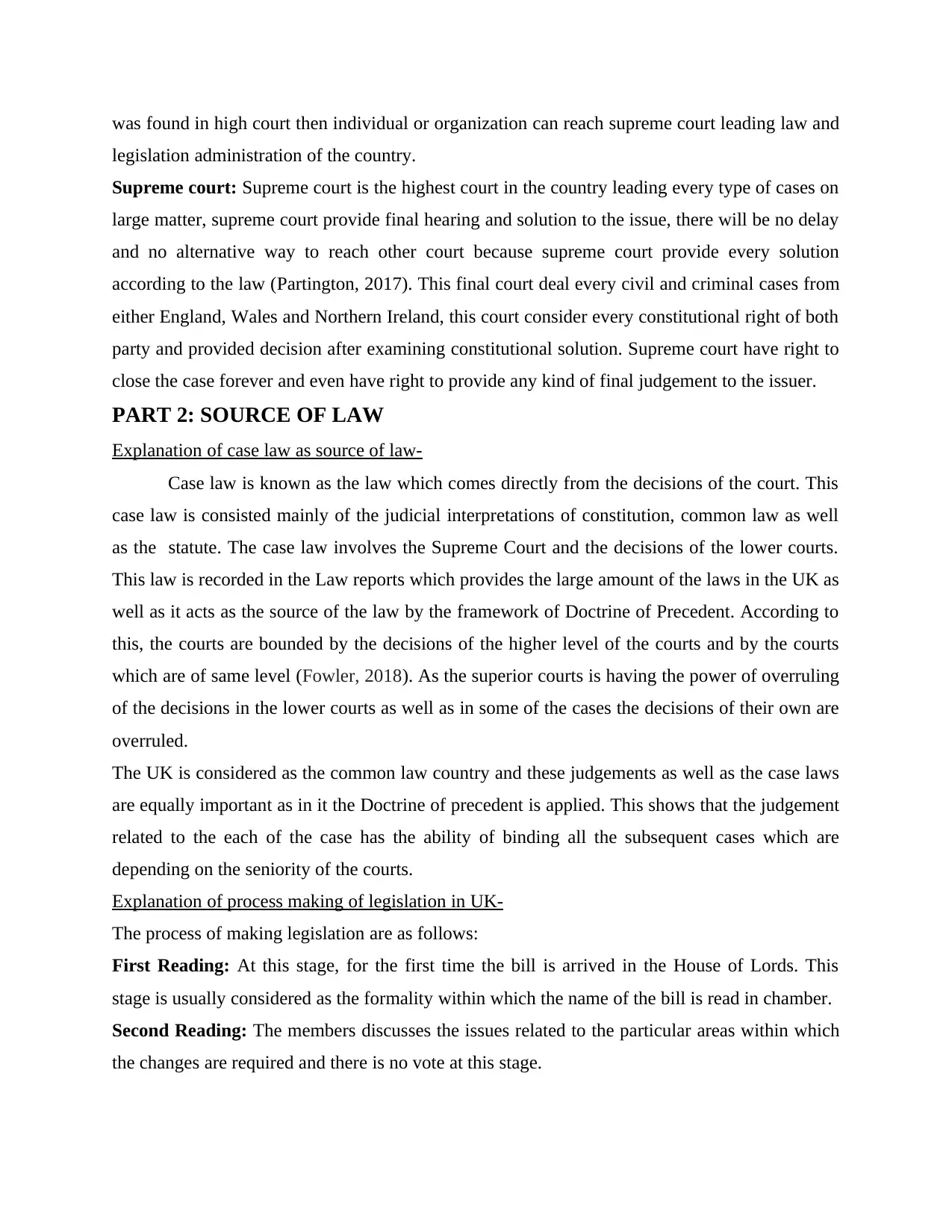
was found in high court then individual or organization can reach supreme court leading law and
legislation administration of the country.
Supreme court: Supreme court is the highest court in the country leading every type of cases on
large matter, supreme court provide final hearing and solution to the issue, there will be no delay
and no alternative way to reach other court because supreme court provide every solution
according to the law (Partington, 2017). This final court deal every civil and criminal cases from
either England, Wales and Northern Ireland, this court consider every constitutional right of both
party and provided decision after examining constitutional solution. Supreme court have right to
close the case forever and even have right to provide any kind of final judgement to the issuer.
PART 2: SOURCE OF LAW
Explanation of case law as source of law-
Case law is known as the law which comes directly from the decisions of the court. This
case law is consisted mainly of the judicial interpretations of constitution, common law as well
as the statute. The case law involves the Supreme Court and the decisions of the lower courts.
This law is recorded in the Law reports which provides the large amount of the laws in the UK as
well as it acts as the source of the law by the framework of Doctrine of Precedent. According to
this, the courts are bounded by the decisions of the higher level of the courts and by the courts
which are of same level (Fowler, 2018). As the superior courts is having the power of overruling
of the decisions in the lower courts as well as in some of the cases the decisions of their own are
overruled.
The UK is considered as the common law country and these judgements as well as the case laws
are equally important as in it the Doctrine of precedent is applied. This shows that the judgement
related to the each of the case has the ability of binding all the subsequent cases which are
depending on the seniority of the courts.
Explanation of process making of legislation in UK-
The process of making legislation are as follows:
First Reading: At this stage, for the first time the bill is arrived in the House of Lords. This
stage is usually considered as the formality within which the name of the bill is read in chamber.
Second Reading: The members discusses the issues related to the particular areas within which
the changes are required and there is no vote at this stage.
legislation administration of the country.
Supreme court: Supreme court is the highest court in the country leading every type of cases on
large matter, supreme court provide final hearing and solution to the issue, there will be no delay
and no alternative way to reach other court because supreme court provide every solution
according to the law (Partington, 2017). This final court deal every civil and criminal cases from
either England, Wales and Northern Ireland, this court consider every constitutional right of both
party and provided decision after examining constitutional solution. Supreme court have right to
close the case forever and even have right to provide any kind of final judgement to the issuer.
PART 2: SOURCE OF LAW
Explanation of case law as source of law-
Case law is known as the law which comes directly from the decisions of the court. This
case law is consisted mainly of the judicial interpretations of constitution, common law as well
as the statute. The case law involves the Supreme Court and the decisions of the lower courts.
This law is recorded in the Law reports which provides the large amount of the laws in the UK as
well as it acts as the source of the law by the framework of Doctrine of Precedent. According to
this, the courts are bounded by the decisions of the higher level of the courts and by the courts
which are of same level (Fowler, 2018). As the superior courts is having the power of overruling
of the decisions in the lower courts as well as in some of the cases the decisions of their own are
overruled.
The UK is considered as the common law country and these judgements as well as the case laws
are equally important as in it the Doctrine of precedent is applied. This shows that the judgement
related to the each of the case has the ability of binding all the subsequent cases which are
depending on the seniority of the courts.
Explanation of process making of legislation in UK-
The process of making legislation are as follows:
First Reading: At this stage, for the first time the bill is arrived in the House of Lords. This
stage is usually considered as the formality within which the name of the bill is read in chamber.
Second Reading: The members discusses the issues related to the particular areas within which
the changes are required and there is no vote at this stage.
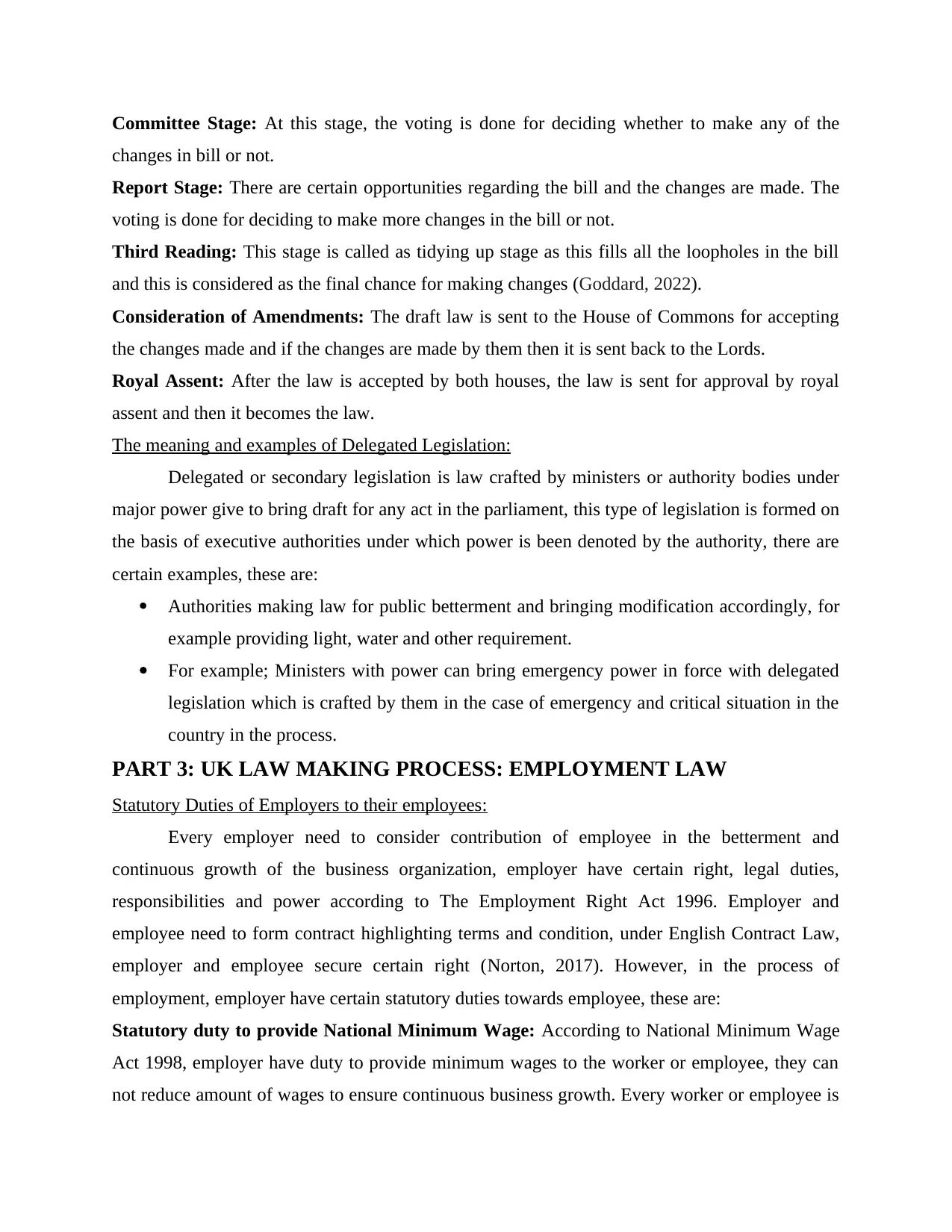
Committee Stage: At this stage, the voting is done for deciding whether to make any of the
changes in bill or not.
Report Stage: There are certain opportunities regarding the bill and the changes are made. The
voting is done for deciding to make more changes in the bill or not.
Third Reading: This stage is called as tidying up stage as this fills all the loopholes in the bill
and this is considered as the final chance for making changes (Goddard, 2022).
Consideration of Amendments: The draft law is sent to the House of Commons for accepting
the changes made and if the changes are made by them then it is sent back to the Lords.
Royal Assent: After the law is accepted by both houses, the law is sent for approval by royal
assent and then it becomes the law.
The meaning and examples of Delegated Legislation:
Delegated or secondary legislation is law crafted by ministers or authority bodies under
major power give to bring draft for any act in the parliament, this type of legislation is formed on
the basis of executive authorities under which power is been denoted by the authority, there are
certain examples, these are:
Authorities making law for public betterment and bringing modification accordingly, for
example providing light, water and other requirement.
For example; Ministers with power can bring emergency power in force with delegated
legislation which is crafted by them in the case of emergency and critical situation in the
country in the process.
PART 3: UK LAW MAKING PROCESS: EMPLOYMENT LAW
Statutory Duties of Employers to their employees:
Every employer need to consider contribution of employee in the betterment and
continuous growth of the business organization, employer have certain right, legal duties,
responsibilities and power according to The Employment Right Act 1996. Employer and
employee need to form contract highlighting terms and condition, under English Contract Law,
employer and employee secure certain right (Norton, 2017). However, in the process of
employment, employer have certain statutory duties towards employee, these are:
Statutory duty to provide National Minimum Wage: According to National Minimum Wage
Act 1998, employer have duty to provide minimum wages to the worker or employee, they can
not reduce amount of wages to ensure continuous business growth. Every worker or employee is
changes in bill or not.
Report Stage: There are certain opportunities regarding the bill and the changes are made. The
voting is done for deciding to make more changes in the bill or not.
Third Reading: This stage is called as tidying up stage as this fills all the loopholes in the bill
and this is considered as the final chance for making changes (Goddard, 2022).
Consideration of Amendments: The draft law is sent to the House of Commons for accepting
the changes made and if the changes are made by them then it is sent back to the Lords.
Royal Assent: After the law is accepted by both houses, the law is sent for approval by royal
assent and then it becomes the law.
The meaning and examples of Delegated Legislation:
Delegated or secondary legislation is law crafted by ministers or authority bodies under
major power give to bring draft for any act in the parliament, this type of legislation is formed on
the basis of executive authorities under which power is been denoted by the authority, there are
certain examples, these are:
Authorities making law for public betterment and bringing modification accordingly, for
example providing light, water and other requirement.
For example; Ministers with power can bring emergency power in force with delegated
legislation which is crafted by them in the case of emergency and critical situation in the
country in the process.
PART 3: UK LAW MAKING PROCESS: EMPLOYMENT LAW
Statutory Duties of Employers to their employees:
Every employer need to consider contribution of employee in the betterment and
continuous growth of the business organization, employer have certain right, legal duties,
responsibilities and power according to The Employment Right Act 1996. Employer and
employee need to form contract highlighting terms and condition, under English Contract Law,
employer and employee secure certain right (Norton, 2017). However, in the process of
employment, employer have certain statutory duties towards employee, these are:
Statutory duty to provide National Minimum Wage: According to National Minimum Wage
Act 1998, employer have duty to provide minimum wages to the worker or employee, they can
not reduce amount of wages to ensure continuous business growth. Every worker or employee is
⊘ This is a preview!⊘
Do you want full access?
Subscribe today to unlock all pages.

Trusted by 1+ million students worldwide
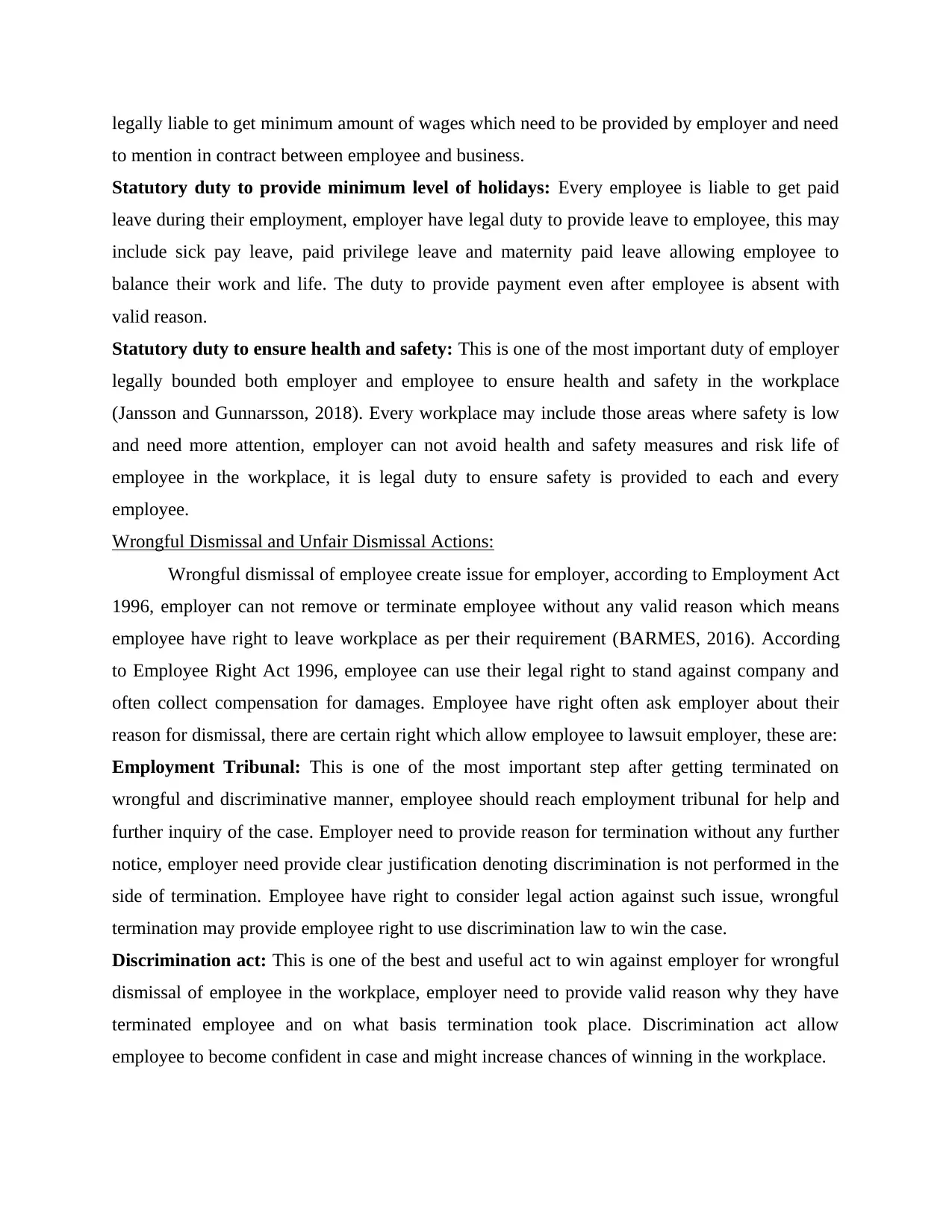
legally liable to get minimum amount of wages which need to be provided by employer and need
to mention in contract between employee and business.
Statutory duty to provide minimum level of holidays: Every employee is liable to get paid
leave during their employment, employer have legal duty to provide leave to employee, this may
include sick pay leave, paid privilege leave and maternity paid leave allowing employee to
balance their work and life. The duty to provide payment even after employee is absent with
valid reason.
Statutory duty to ensure health and safety: This is one of the most important duty of employer
legally bounded both employer and employee to ensure health and safety in the workplace
(Jansson and Gunnarsson, 2018). Every workplace may include those areas where safety is low
and need more attention, employer can not avoid health and safety measures and risk life of
employee in the workplace, it is legal duty to ensure safety is provided to each and every
employee.
Wrongful Dismissal and Unfair Dismissal Actions:
Wrongful dismissal of employee create issue for employer, according to Employment Act
1996, employer can not remove or terminate employee without any valid reason which means
employee have right to leave workplace as per their requirement (BARMES, 2016). According
to Employee Right Act 1996, employee can use their legal right to stand against company and
often collect compensation for damages. Employee have right often ask employer about their
reason for dismissal, there are certain right which allow employee to lawsuit employer, these are:
Employment Tribunal: This is one of the most important step after getting terminated on
wrongful and discriminative manner, employee should reach employment tribunal for help and
further inquiry of the case. Employer need to provide reason for termination without any further
notice, employer need provide clear justification denoting discrimination is not performed in the
side of termination. Employee have right to consider legal action against such issue, wrongful
termination may provide employee right to use discrimination law to win the case.
Discrimination act: This is one of the best and useful act to win against employer for wrongful
dismissal of employee in the workplace, employer need to provide valid reason why they have
terminated employee and on what basis termination took place. Discrimination act allow
employee to become confident in case and might increase chances of winning in the workplace.
to mention in contract between employee and business.
Statutory duty to provide minimum level of holidays: Every employee is liable to get paid
leave during their employment, employer have legal duty to provide leave to employee, this may
include sick pay leave, paid privilege leave and maternity paid leave allowing employee to
balance their work and life. The duty to provide payment even after employee is absent with
valid reason.
Statutory duty to ensure health and safety: This is one of the most important duty of employer
legally bounded both employer and employee to ensure health and safety in the workplace
(Jansson and Gunnarsson, 2018). Every workplace may include those areas where safety is low
and need more attention, employer can not avoid health and safety measures and risk life of
employee in the workplace, it is legal duty to ensure safety is provided to each and every
employee.
Wrongful Dismissal and Unfair Dismissal Actions:
Wrongful dismissal of employee create issue for employer, according to Employment Act
1996, employer can not remove or terminate employee without any valid reason which means
employee have right to leave workplace as per their requirement (BARMES, 2016). According
to Employee Right Act 1996, employee can use their legal right to stand against company and
often collect compensation for damages. Employee have right often ask employer about their
reason for dismissal, there are certain right which allow employee to lawsuit employer, these are:
Employment Tribunal: This is one of the most important step after getting terminated on
wrongful and discriminative manner, employee should reach employment tribunal for help and
further inquiry of the case. Employer need to provide reason for termination without any further
notice, employer need provide clear justification denoting discrimination is not performed in the
side of termination. Employee have right to consider legal action against such issue, wrongful
termination may provide employee right to use discrimination law to win the case.
Discrimination act: This is one of the best and useful act to win against employer for wrongful
dismissal of employee in the workplace, employer need to provide valid reason why they have
terminated employee and on what basis termination took place. Discrimination act allow
employee to become confident in case and might increase chances of winning in the workplace.
Paraphrase This Document
Need a fresh take? Get an instant paraphrase of this document with our AI Paraphraser
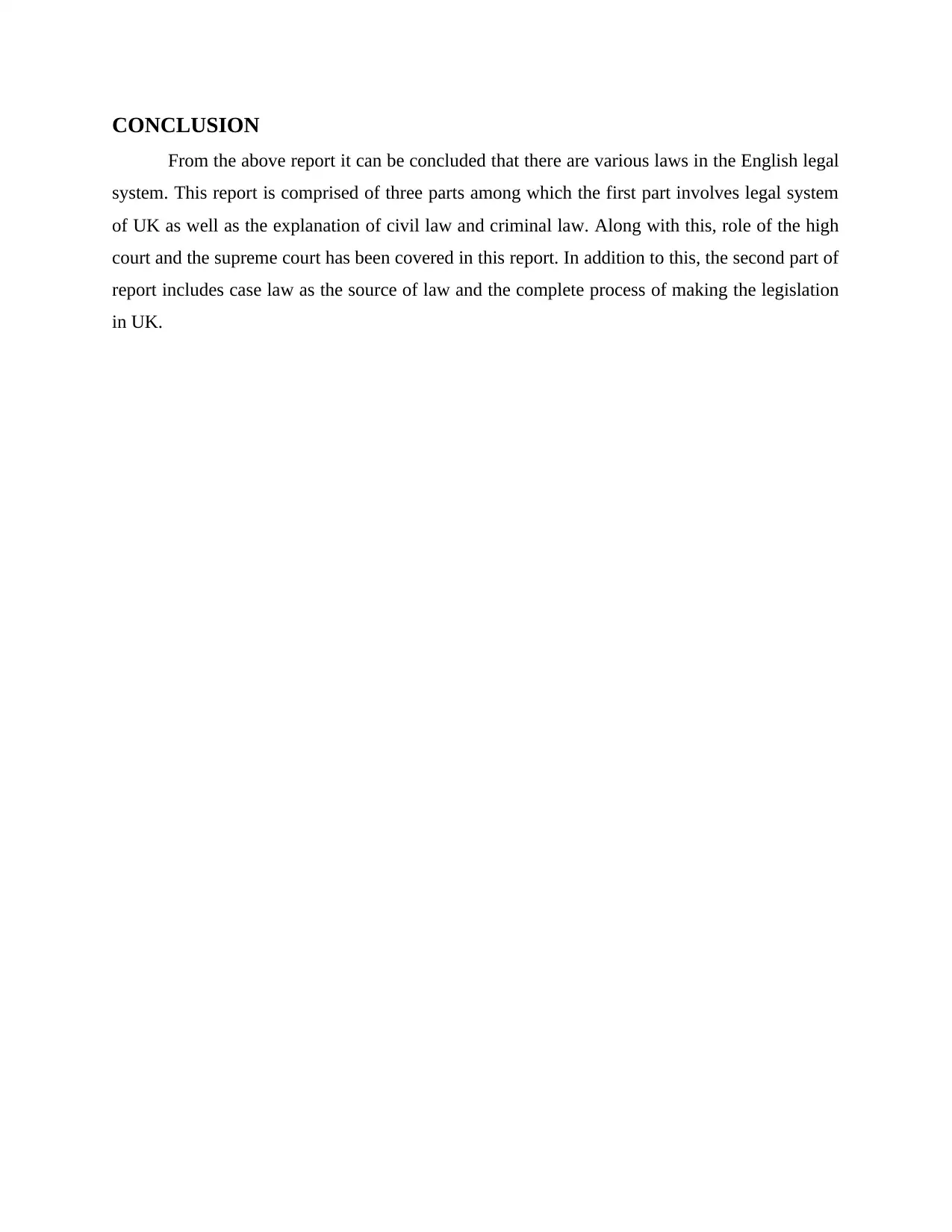
CONCLUSION
From the above report it can be concluded that there are various laws in the English legal
system. This report is comprised of three parts among which the first part involves legal system
of UK as well as the explanation of civil law and criminal law. Along with this, role of the high
court and the supreme court has been covered in this report. In addition to this, the second part of
report includes case law as the source of law and the complete process of making the legislation
in UK.
From the above report it can be concluded that there are various laws in the English legal
system. This report is comprised of three parts among which the first part involves legal system
of UK as well as the explanation of civil law and criminal law. Along with this, role of the high
court and the supreme court has been covered in this report. In addition to this, the second part of
report includes case law as the source of law and the complete process of making the legislation
in UK.
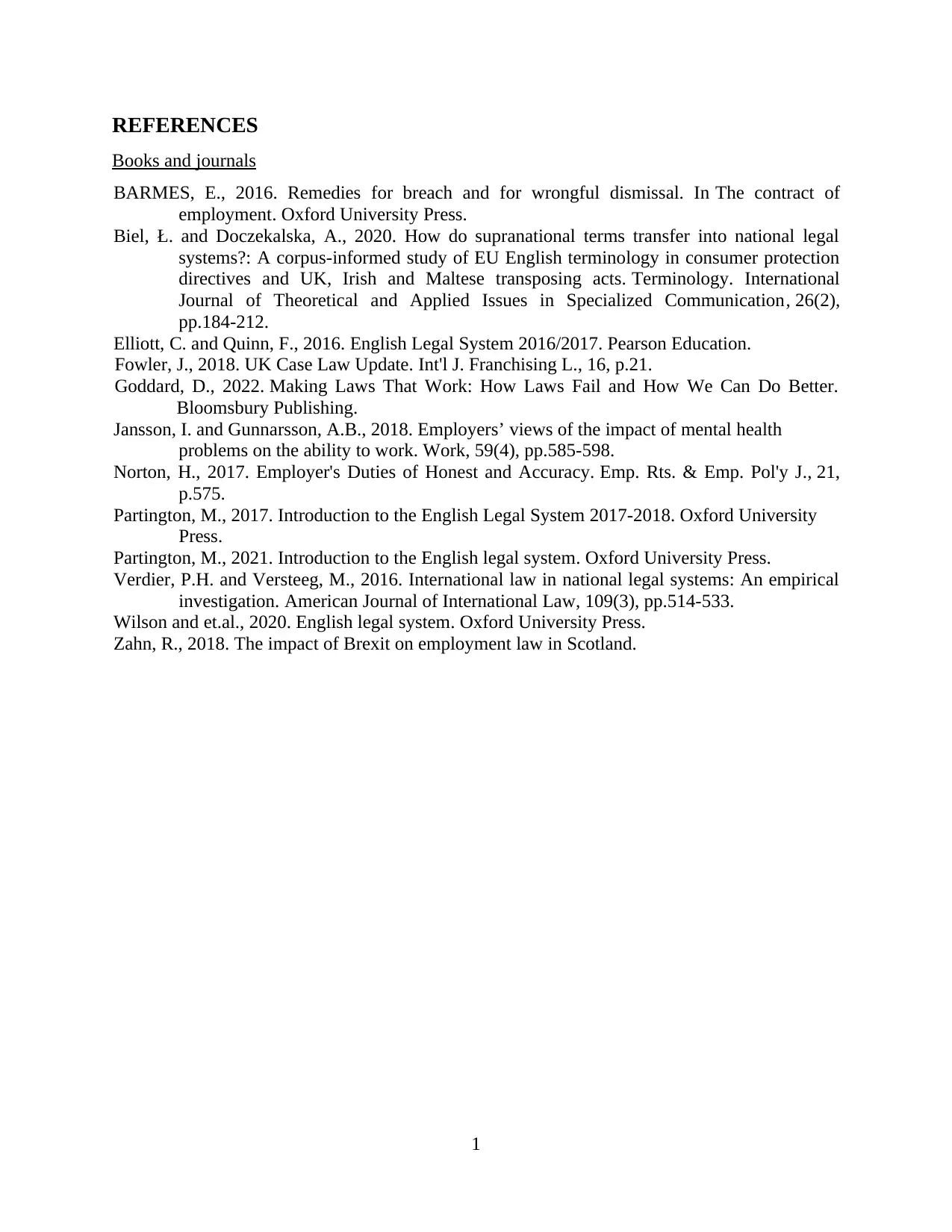
REFERENCES
Books and journals
BARMES, E., 2016. Remedies for breach and for wrongful dismissal. In The contract of
employment. Oxford University Press.
Biel, Ł. and Doczekalska, A., 2020. How do supranational terms transfer into national legal
systems?: A corpus-informed study of EU English terminology in consumer protection
directives and UK, Irish and Maltese transposing acts. Terminology. International
Journal of Theoretical and Applied Issues in Specialized Communication, 26(2),
pp.184-212.
Elliott, C. and Quinn, F., 2016. English Legal System 2016/2017. Pearson Education.
Fowler, J., 2018. UK Case Law Update. Int'l J. Franchising L., 16, p.21.
Goddard, D., 2022. Making Laws That Work: How Laws Fail and How We Can Do Better.
Bloomsbury Publishing.
Jansson, I. and Gunnarsson, A.B., 2018. Employers’ views of the impact of mental health
problems on the ability to work. Work, 59(4), pp.585-598.
Norton, H., 2017. Employer's Duties of Honest and Accuracy. Emp. Rts. & Emp. Pol'y J., 21,
p.575.
Partington, M., 2017. Introduction to the English Legal System 2017-2018. Oxford University
Press.
Partington, M., 2021. Introduction to the English legal system. Oxford University Press.
Verdier, P.H. and Versteeg, M., 2016. International law in national legal systems: An empirical
investigation. American Journal of International Law, 109(3), pp.514-533.
Wilson and et.al., 2020. English legal system. Oxford University Press.
Zahn, R., 2018. The impact of Brexit on employment law in Scotland.
1
Books and journals
BARMES, E., 2016. Remedies for breach and for wrongful dismissal. In The contract of
employment. Oxford University Press.
Biel, Ł. and Doczekalska, A., 2020. How do supranational terms transfer into national legal
systems?: A corpus-informed study of EU English terminology in consumer protection
directives and UK, Irish and Maltese transposing acts. Terminology. International
Journal of Theoretical and Applied Issues in Specialized Communication, 26(2),
pp.184-212.
Elliott, C. and Quinn, F., 2016. English Legal System 2016/2017. Pearson Education.
Fowler, J., 2018. UK Case Law Update. Int'l J. Franchising L., 16, p.21.
Goddard, D., 2022. Making Laws That Work: How Laws Fail and How We Can Do Better.
Bloomsbury Publishing.
Jansson, I. and Gunnarsson, A.B., 2018. Employers’ views of the impact of mental health
problems on the ability to work. Work, 59(4), pp.585-598.
Norton, H., 2017. Employer's Duties of Honest and Accuracy. Emp. Rts. & Emp. Pol'y J., 21,
p.575.
Partington, M., 2017. Introduction to the English Legal System 2017-2018. Oxford University
Press.
Partington, M., 2021. Introduction to the English legal system. Oxford University Press.
Verdier, P.H. and Versteeg, M., 2016. International law in national legal systems: An empirical
investigation. American Journal of International Law, 109(3), pp.514-533.
Wilson and et.al., 2020. English legal system. Oxford University Press.
Zahn, R., 2018. The impact of Brexit on employment law in Scotland.
1
⊘ This is a preview!⊘
Do you want full access?
Subscribe today to unlock all pages.

Trusted by 1+ million students worldwide
1 out of 9
Related Documents
Your All-in-One AI-Powered Toolkit for Academic Success.
+13062052269
info@desklib.com
Available 24*7 on WhatsApp / Email
![[object Object]](/_next/static/media/star-bottom.7253800d.svg)
Unlock your academic potential
Copyright © 2020–2025 A2Z Services. All Rights Reserved. Developed and managed by ZUCOL.



